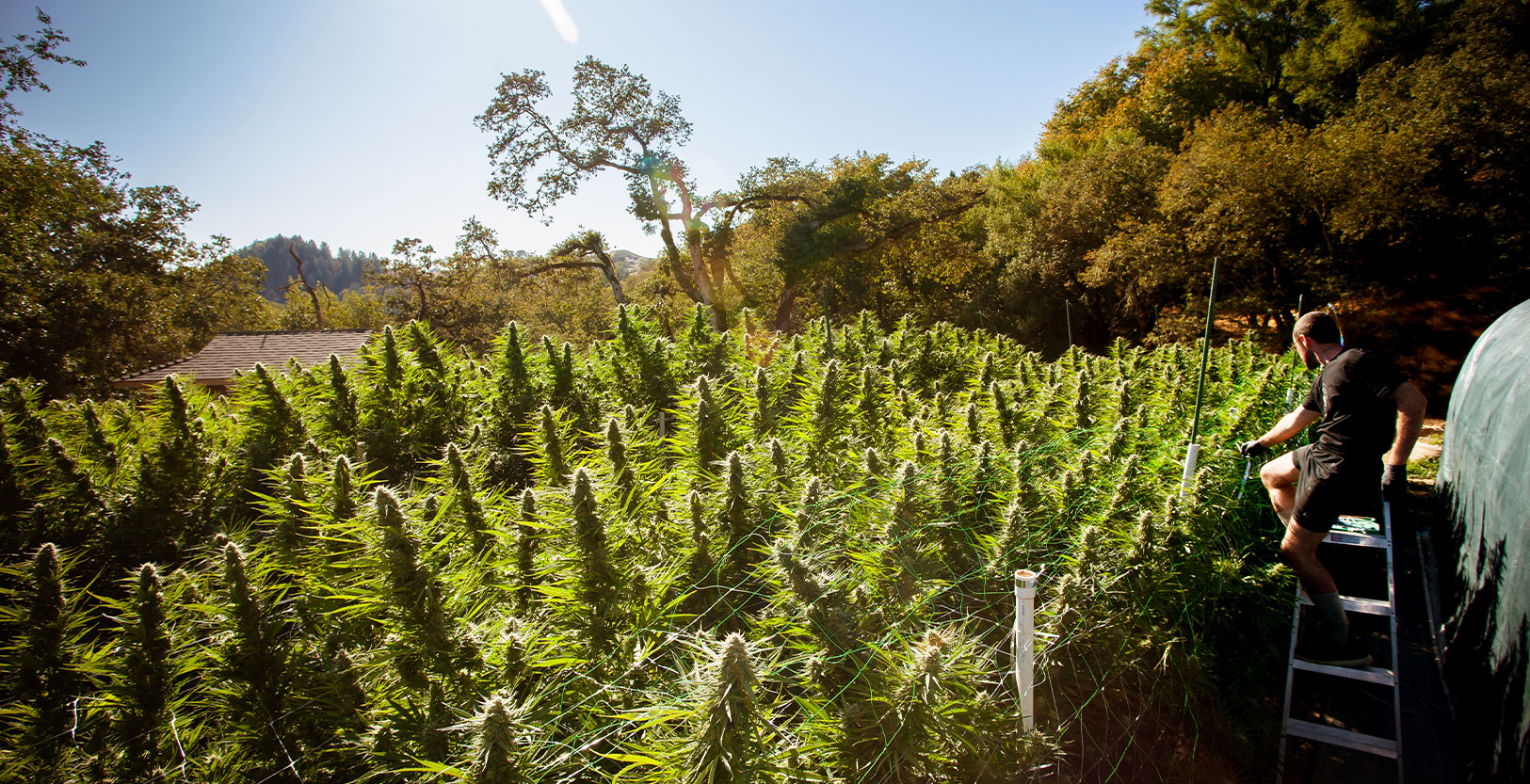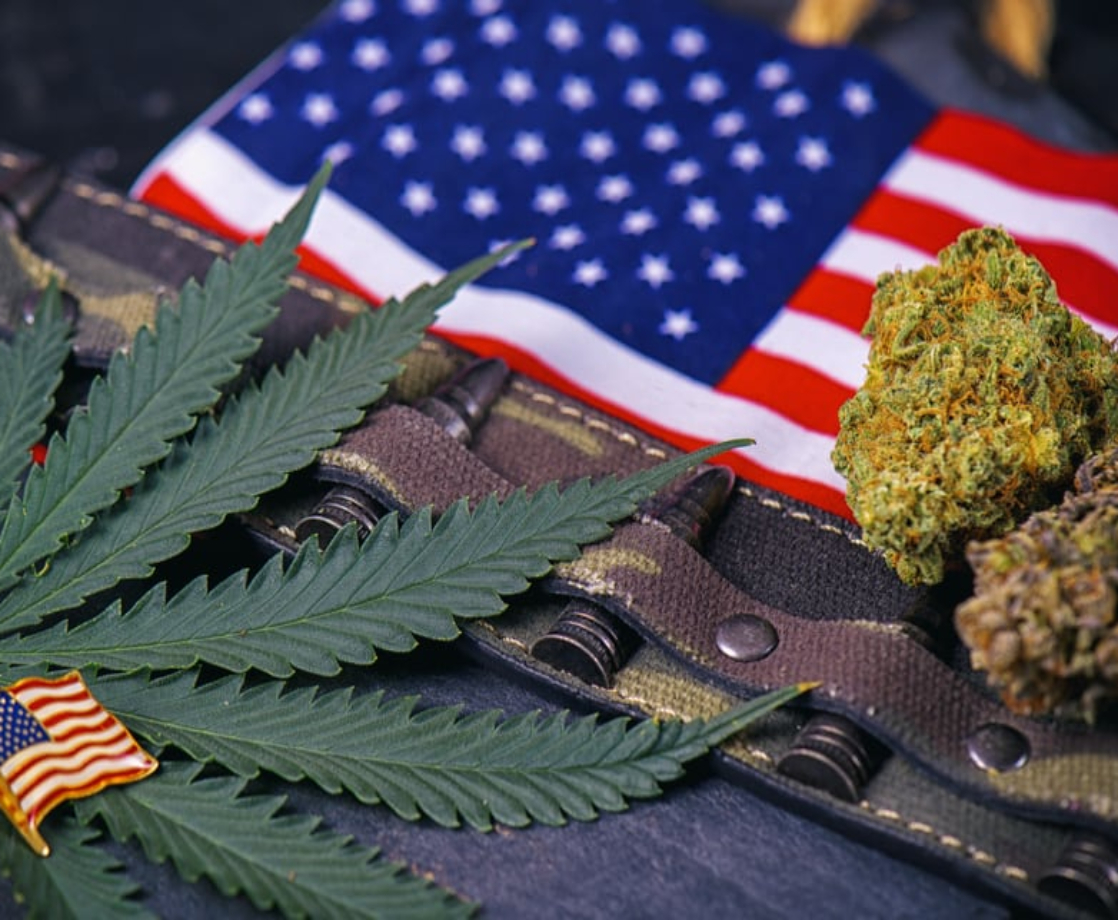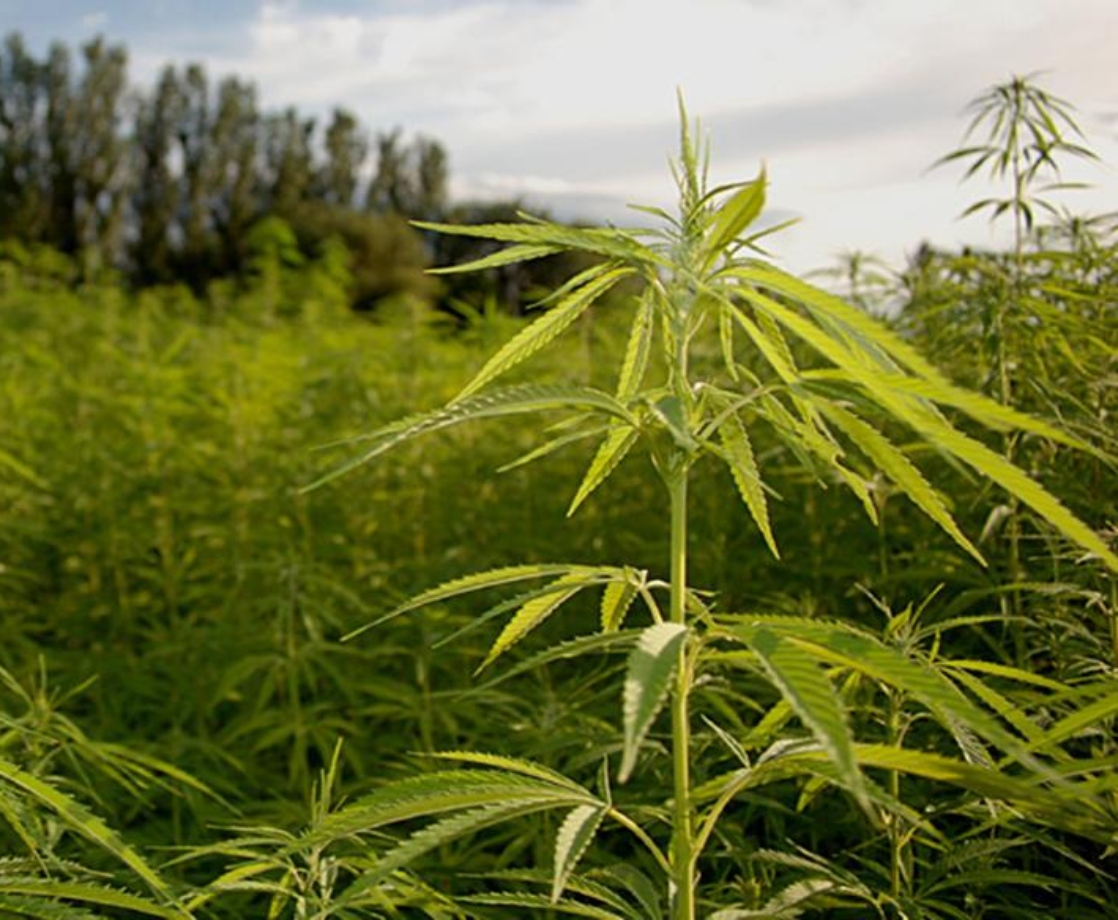Image via
The Emerald Triangle is to sungrown cannabis what the Bordeaux region of France is to wine: The land of legendary fruit. It’s why the Golden State is world-renowned for its luscious weed. It’s the reason California should have the most successful cannabis market in the world. Unfortunately, that’s not how Proposition 64 is panning out. Five years after legalizing cannabis, the state is the only entity making money on the legal weed industry.
To make matters worse, California just raised its weed taxes, again, even though most legal businesses are drowning in a whirlpool of regulatory expenses. According to Tim Blake, the founder of the Emerald Cup, California’s top-tier cannabis event, the industry is at its lowest point. “As far as small farmers and legacy growers up [in the Emerald Triangle] are concerned, we’re looking at an extinction event,” he says. “People are being completely crushed.”
The price of outdoor flower plummeted over the summer and into the fall, and it’s putting small farms out of business. A pound of quality sungrown cannabis from Northern California currently costs $250-$450, whereas it used to go for $1200 or more. The market is oversaturated with flower, and legal farms are producing more cannabis than dispensaries can sell. It’s partly due to the fact there aren’t enough legal shops (or enough weed smokers) in California. 80 to 90 percent of the state’s municipalities still uphold cannabis prohibition, meaning most of California is off-limits to the weed industry. People often call these non-legal cities “weed deserts,” but the reality is these areas are home to thriving illegal weed markets. California’s legal pot industry can’t keep up with the legacy weed trade. Not only is it massive, but it’s also resilient. And the illicit cannabis market gets bigger with every legal business that folds.
California’s government has created the perfect climate for the unregulated weed market to thrive and deep-pocketed corporations to commandeer the land of small farmers in the Emerald Triangle. “It really is just more of a very particular thing that historians will write about in California in the coming years and decades,” says Blake. “They’ll be like, ‘How did this take place? What happened?’ And really, it’s Gavin Newsom who did that. He shafted us by letting all the big farmers and players into the industry right away without giving small farmers and businesses a fair chance to get started.”
Thankfully, the Emerald Cup team is in a position to help struggling farms. Last week they announced the winners of the Emerald Cup Small Farms Initiative, a program designed to give $150,000 in free booth space to struggling Emerald Triangle farmers. The goal is to give them a platform to sell enough product to sustain their businesses through the winter. “I hear up to 90 percent of small farmers won’t make it to springtime,” says Blake, who plans to continue the Small Farms Initiative project into the future. “I’ve been saying this for a while, and people were saying I was being paranoid and fearful. But now we’re watching this situation unfold.”
Waves of change are also hitting the Emerald Cup. This December 11 and 12 marks the first Emerald Cup Harvest Ball, a new event kicking off the countdown to the Emerald Cup Awards and legendary festival that will take place in the heart of Los Angeles in the spring of 2022. It’s hard not to see this transition as a reflection of the market’s instability in NorCal. But Blake feels optimistic about the move. “I’m really excited to merge with the LA community and to really bring the growing culture and education down to SoCal. Then we can have SoCal as a base for a nationwide, and eventually, worldwide competition.”
The Emerald Cup Harvest Ball is coming at a heavy moment in California cannabis history. It’s hard to celebrate in the shadow of such a massive regulatory failure. One thing is certain, however: Most of that product is going to the traditional market and will be disseminated throughout the state and the country. In other words, some of the best weed in the world is on the unregulated market, and at a fraction of the price of cannabis sold in legal dispensaries. In the words of David Byrne, it’s the same as it ever was.
We caught up with Tim Blake to get the details about the Harvest Ball, what’s going on with small farmers in the Emerald Triangle, and a lot more. Enjoy, and support craft, outdoor cannabis farms!
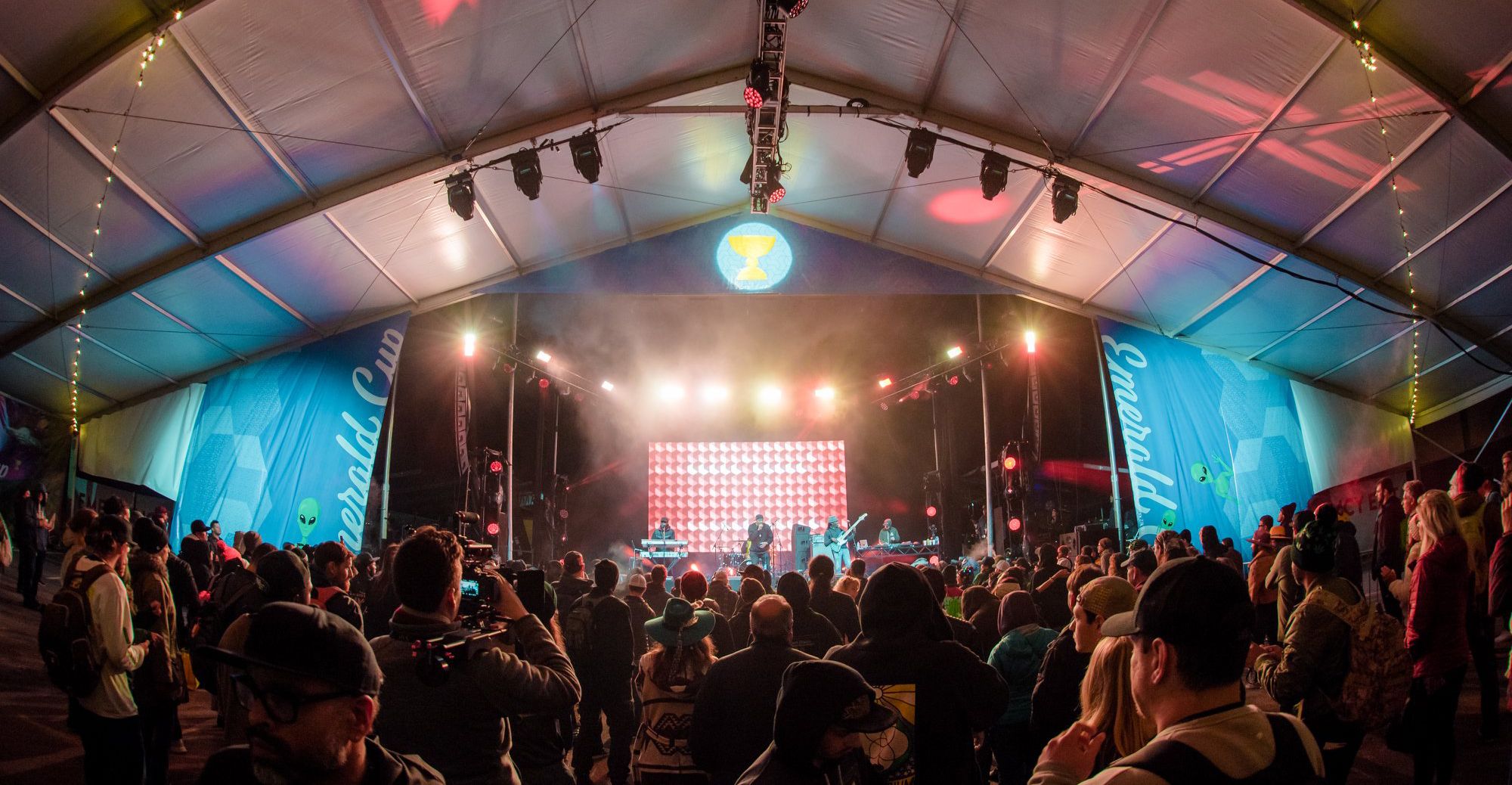
Live music at the Emerald Cup (Courtesy of the Emerald Cup)
MERRY JANE: How is it being in the center of the chaos happening in Humboldt right now?
Tim Blake: It’s not great. Things are really hard right now. I hear up to 90 percent of the small farmers won’t make it to springtime. I’ve been saying this for a while, and people were saying I was being paranoid and fearful. But now we’re watching this situation unfold. I talk about it a lot, and the central issue is simple: Once Gavin Newsom and some major cannabis players pushed to open up Prop. 64 to large scale farming two months into legalization, and we went from not being allowed to have farms over one-acre to where corps and people could have 10- 20- 30- 40-acre farms — what did you think was going to happen? That’s why Prop. 64 originally set out so no one could have over an acre. It was designed that way intentionally so that small farms could slowly sunset, and Newsom basically crushed them.
So that’s the crux of what happened. While these small farmers have taken all their money to try to get through the building departments, the Department of Fish and Wildlife, and everything to fulfill their legal obligations, the industry has just crushed around them. People can’t even sell their mixed-light flower that’s totally AAA [the creme de la crem] coming in at $450 a pound. So I think you’re going to basically see an extinction event between Willits and Fortuna.
It’s hard for me to wrap my head around what the move is from here. What are the people who are losing farms going to do?
You’re going to see towns basically close up. So many people whose farms that were worth half a million dollars are now worth $500. A lot of these homes, ranches, and farms are going to be abandoned. You won’t even see people living on half of the land where these small farms are.
I live in Laytonville, and the health community center is looking at closing up and our restaurant out here just closed up. What really happens to people and a way of life that’s been up here for 40- to 60-years. And as you get closer to Ukiah, the bigger cities, it won’t have as much of an effect. But the Backwoods people are experiencing complete devastation. And after being up here for 40 years, I have a hard time even grokking. Like, what does this mean for all of us? What do we do? Do we all just move out and abandon these places?
Are there any bright sides to this massive regulatory failure? Or is it just one massive disaster?
Once dispensaries open up across the state and once interstate commerce gets going — I hear Republicans are really pushing that now — and we get federal legalization and we get rid of some of these excessive taxes and regulations, I think in a couple years we’ll see a lot of these people come back to life. But, those who can’t hold on over the next 18 months, they’re not going to make it. Unfortunately, that’s the majority of people.
But legalization in California did push the rest of the country and the world. We’re watching tons of states opening up. Who would have ever thought Oklahoma would blow up the way it did. So many of the long-term prison sentences are gone. We’re seeing some traditional market people embracing cannabis like never before. We’ve unleashed cannabis onto the world and the genie’s never going back in the bottle. So on the good side of it, you’re seeing something take place that we all dreamed and hoped for, which is that cannabis is becoming the most valuable agricultural crop in the world, medicinally- and recreational-wise.
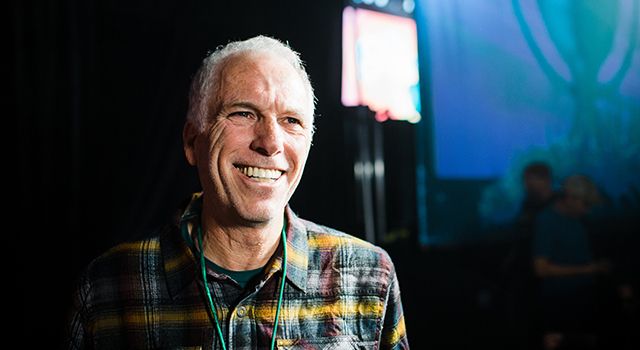
Tim Blake (Courtesy of the Emerald Cup)
It’s incredible you’re able to help some people through this hardship with the Emerald Cup platform. How did the Emerald Cup Small Farms Initiative go?
A friend of mine had an extra 50 acres of cannabis that he wasn’t going to harvest. And so he came to me and said, “We’re not even going to harvest this. You can give this away if you want.” So we started talking to people like Sweet Leaf Joe in San Francisco about mounting up this campaign to harvest all the plants. But by the time three weeks went by, we realized that there was going to be so much free bud given out that we didn’t even need to harvest it and that we should just compost it all. And then we started realizing what that meant for small farmers. We were like, “Oh my gosh, we’ve got to do everything we can, in whatever way we can, to help them.”
So we devised this program and came up with a small farmer’s initiative. We can’t help everybody, but we can give up 25 to 35 free booths. That’s about $150,000 in free booths to small farmers. We chose the winners through a lottery system on an app, no one knew who was going to win. We just announced the winners live on KMUD Redwood Community Radio [last week]. We’re going to let the lottery winners set up and get almost all the dollars at the market, so that these people can survive through the winter and make it. We also plan to carry on that program into LA. We can carry it on every year going forward, and thankfully my partners and my team all stepped up and said they were down to do it. I’ve never been more proud of the Emerald Cup team. People think we make a lot of money. We don’t, we lost a million dollars a couple of years into legalization, and we’ve only made money three years out of the 18 we’ve been doing the festival.
So, wait, what’s going to happen now that California just raised cannabis taxes again?
Genine Coleman from the Origins Council and Appellations project is putting together a list of demands and requests of the state to rescind the cultivation tax and to streamline the whole process. We’re going to evangelize her set of proposals that she’s coming with, and we’re going to bring those to the Emerald Cup and talk about those. Rather than create our own, we’re going to go follow Genine and the Origins Council and the rest of the team, and scream to the state that this is what has to get done to stop this extinction event.
Where is all this extra cannabis going to go? Into compost!?
Well, yes and no. At the Emerald Cup you’re going to see the largest compassionate care giveaway of cannabis in…ever. Nobody could have imagined that this amount of cannabis would be given away. I mean, we’re going to see, like, up to 100,000 pounds of cannabis given away to people this year, specifically to the underprivileged and minorities. For the past 25 years, Sweetleaf Joe has been working for free to bring cannabis to people on the streets of San Francisco and AIDS victims. So we’re going to give him an award. We’re so proud of what Joe has done.
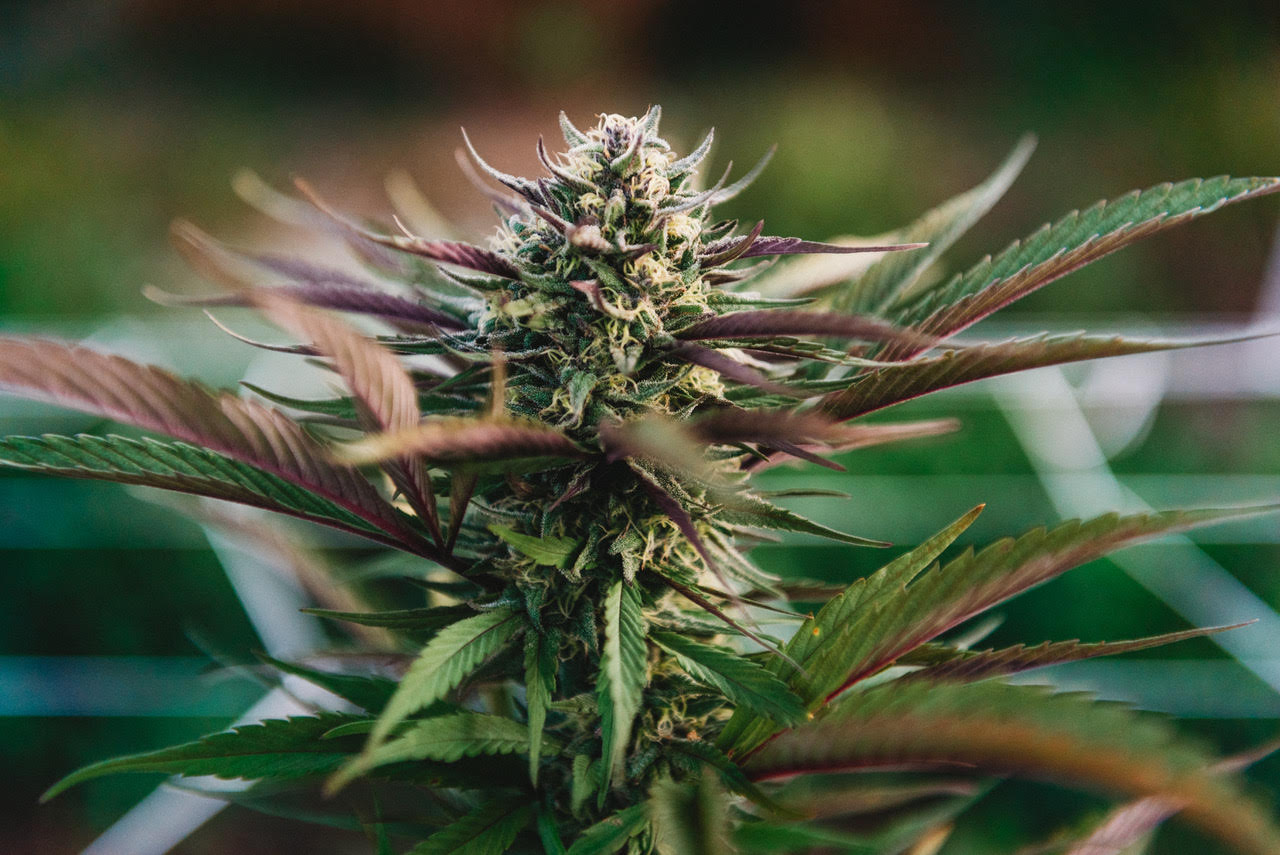
Outdoor flower from Humboldt (image via)
I know there’s a bit of contention between LA cannabis and Humboldt cannabis crews, mostly due to competition and the new industry that exists versus the OG, rich cannabis heritage that’s in Humboldt. But, I know a lot of people in LA who are really excited for the event to be held in the City, and who want to help and care about sungrown, craft cannabis farms.
I’m impressed by LA. We went down and planted our flag last year with the Emerald Cup Awards, and we’re moving to LA with the main event this next year, and I have been very surprised. There’s a really evolved group of people in LA. They’re very hip, and LA has taken the lead in cannabis right now. If you look at it with the actors and the musicians and all the artists, I mean, LA’s always had a lot going on down there. And we’re very, very proud to go into LA. It’s the largest consumer market, media market in the world. It’s where we need to bridge the south and the north together. That’s why we brought indoor cannabis into the contest last year. And we’re really happy to go into LA with that and bringing Jungle Boys and everybody together with us. It’s time to stop the separatio, and bring us all together. We’re Californians. We need to work together. We need to help each other. It’s all about educating people in LA, and they seem really receptive to it.
I hear there’s going to be a Frenchy Cannoli Award this year. Can you tell me any information about that?
Frenchy’s been a major part of the cup for years. We’re going to give him a special legacy award for what he’s done for us. His hookah has run at our area 101 spot for a number of years.
We’re going to honor him. There’s just nobody like Frenchy. He’s such a unique, passionate, and loving person. Of all the people in the industry, it’s like, I don’t think anybody could say a bad word about Frenchy. I mean, he’s just one of those people. Its like he’s just loved across the board and he’s been such an evangelist for cannabis. He’s been a judge for the cup, a speaker for the cup. Every aspect of the cup he’s been part of and we’re going to miss him very much. Although, he will be there in spirit with us.
We’ve realized that a lot of these people who have led us in the cannabis world are getting older in the industry. We’ve lost Subcool, Frenchy, and a lot of people over the last few years. They just keep going on us, and so we have the lifetime achievement, but we’re going to start honoring more and more of these older legacy people because they mean so much to us, and I’d rather give them the awards when they’re alive. In Frenchy’s case, we had no idea that he would go so quickly. His legacy will live on forever.
Are psychedelics going to fit into the event this year?
We have two panels on psychedelics led by some of the leading people in California. I’ve really embraced psychedelics at a different level and am starting to evangelize for that at a different level. And so I’m very excited about that and how to start embracing that more and more at the cup. We’re also helping Decrim California at the Cup this year by letting them sign signatures.
People have asked if we are going to do a psychedelics cup. And I’ve told them that we don’t need to do a cup, because the people at Oakland Hyphae, Reggie and Ian, have done a great job. They’re bringing such important information to their communities. The inner cities and minorities and everybody need this. So, yeah, Reggie’s done some great work. He and his partner, Ian, I think they’ve done a great job and I’m really proud of them. And I’m proud of that whole community. Danielle from the San Francisco Psychedelic Society, too, and Bear, and all of them.
If there’s one thing you want people to know about the Emerald Cup Harvest Ball or the event moving to LA, what would it be?
We’ve always been proud that we’re a gathering of the community, that we bring the community together. People from all over the country come to the Emerald Cup and they say they feel so welcomed by our volunteers. People say that nobody holds back information — nothing feels gate kept. Our event is all about education. It’s all about teaching and inspiring each other. And I’m really proud that the Emerald Cup has always been that in Santa Rosa. And that’s what we’re going to do in L.A.
Here is the list of Small Farm Initiative winners:
Humboldt County
- Woodnote Farms (@woodnotefarms)
- Bella Farms
- Native Humboldt Farms (@nativehumboldt)
- Neukom Family Farm (@Neukomfamilyfarm)
- Whitethorn Valley Farm (@whitethornvalleyfarm)
- Briceland Forest Farm (@bricelandforestfarm)
- Sunnabis: Humboldt’s Full Sun Farms (@Sunnabis)
- Redwood Roots Distribution (@redwoodroots.family)
Lake County
- Flower Lady Farms
- Noble Gardens
- Magic Meadow Farm’s (@magic_meadow_farms_)
Mendocino County
- River Txai Farms, Arcanna Flowers (@arcanna_flowers)
- Higher Heights (@higherheightsmendo)
- Lovingly & Legally
- Flying Tiger Farm (@flyingtigerfarm)
- Mendocino Family Farm (@mendofamilyfarm)
- Esensia (@esensiagardens)
- Emerald Spirit Botanicals (@emeraldspiritbotanicals)
- Happy Day Farms (@happydayfarms)
- Sovereign (@sovereign_707)
- Mendocino Producers Guild (@mendopg984)
Nevada County
- Bud Farm (@thebudfarm)
- Yuba River Organics – Sierra Sungrown Co-op (@yubariverorganics)
- Frogville Farms (@frogville_farms)
- Down Om Farms (@downomfarms)
Santa Cruz County
Sonoma County
- OG Gardens (@OGgardenscannabis)
- Sweet Creek Farm (@sweetcreekfarm)
- Spring Creek Farm (@springcreek_farm)
Trinity County


